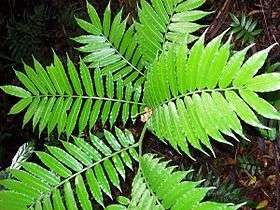Angiopteris evecta
| Giant Fern | |
|---|---|
 | |
| Scientific classification | |
| Kingdom: | Plantae |
| Division: | Pteridophyta |
| Class: | Marattiopsida |
| Order: | Marattiales |
| Family: | Marattiaceae |
| Genus: | Angiopteris |
| Species: | A. evecta |
| Binomial name | |
| Angiopteris evecta (G.Forst.) Hoffm. | |
| Synonyms | |
Angiopteris evecta, commonly known as the Giant Fern, is a rare plant occurring in eastern and northern Australia. Also found growing in nearby islands such as New Guinea and various places in Polynesia and Melanesia.[1] Listed as endangered in New South Wales, where it has been recorded growing in sub tropical rainforest, in the valley of the Tweed River.[2] It is an invasive species in Hawaii and Jamaica.
Angiopteris evecta is the type species of the genus Angiopteris. It was originally described as Polypodium evectum by Georg Forster in 1786,[3] before being reclassified and given its current binomial name in 1796 by Georg Franz Hoffmann.[4] The species name is the Latin adjective evectus "swollen" or "inflated".[5] Common names include giant fern, king fern, oriental vessel fern, and mule's foot fern.
The huge mature fronds measure up to 8 metres (25 ft) long. They originate from a large thick rootstock, up to 150 cm (60 in) high.
Angiopteris evecta can be grown in well-drained moist sites in the garden with some shade. It is unable to be propagated by spores but the lobes from the frond base can be removed and will form a new plant in around a year in a medium of sand and peat.[5]
References
- ↑ "Angiopteris evecta". Global Invasive Species.
- ↑ "Angiopteris evecta". PlantNET - NSW Flora Online. Retrieved 2010-07-12.
- ↑ "Polypodium evectum G.Forst.". Australian Plant Name Index (APNI), IBIS database. Centre for Plant Biodiversity Research, Australian Government.
- ↑ "Angiopteris evecta (G.Forst.) Hoffm.". Australian Plant Name Index (APNI), IBIS database. Centre for Plant Biodiversity Research, Australian Government.
- 1 2 Elliot, Rodger W.; Jones, David L.; Blake, Trevor (1985). Encyclopaedia of Australian Plants Suitable for Cultivation: Vol. 2. Port Melbourne: Lothian Press. p. 195. ISBN 0-85091-143-5.
